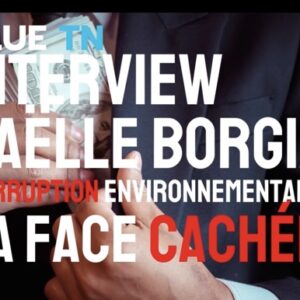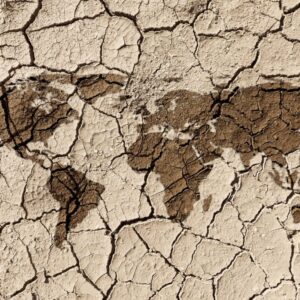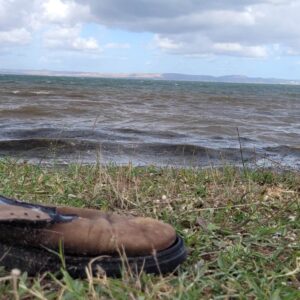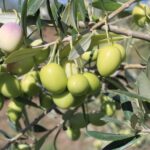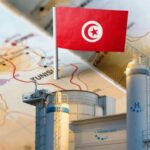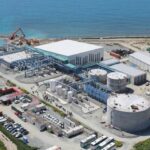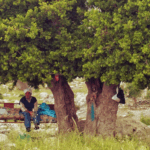They rise before dawn, walk the dry fields, mend nets by fading shorelines, and yet remain unheard in the rooms where decisions about their futures are made. Across Tunisia, Algeria, and Morocco, rural women bear the hidden weight of climate change, preserving crops, water, and traditional knowledge. Despite being at the heart of North Africa’s environmental crisis, access to climate information, crucial for participation and protection, remains out of reach, leaving their experiences and needs unheard in the region’s green transition.
When the Climate Turns Hostile, Women in the Maghreb Speak Out
Over the past ten years, when I’ve managed to collect a few specimens of clams, I’ve noticed that their shells are thin and break easily, » says Khadija to BLUE TN, a clam digger from Gabes, Tunisia, her hands roughened by years of work along the coast.« I inherited this precious tradition from my mother and grandmother. But now I wonder if there are any clams left in the sea?
For generations, the women of the Gulf of Gabes have collected clams, sustaining families and local markets while passing down knowledge of tides, seasons, and the delicate balance of the coastal ecosystem. Today, their livelihoods and a centuries-old tradition are under threat. Chemical pollution, rising temperatures, shifting currents, and increasingly unpredictable weather have altered marine life, leaving shells fragile and clam populations dwindling. Khadija’s story is emblematic of a larger crisis: across North Africa, climate change is not an abstract threat; it is a daily struggle with water scarcity, crop failures, and the disappearance of species. Up in the Algerian mountains, while documenting traditional plant distillation practices, something unexpected moved Aicha Ould Habib, environmental journalist, director, and founder of “Hicoplant”. Not the science. Not the process. But the women.
Rural women are not simply impacted by the environmental crisis ; they stand at its very centre, preserving ecological heritage and carrying knowledge systems that risk disappearing. Aicha Ould Habib
Across the border, in Morocco, the same frontline reality unfolds through a different daily struggle: access to water. In an isolated mountain village, Fatima rises before dawn and shoulders a clay jug. For generations, women here have been the “water guardians”, walking kilometres before sunrise in search of water. Often they return with nothing, and when they do find water, children and elders drink first, livestock next, and women last. From Khadija’s coastal village in Gabès to Fatima’s isolated mountain community in Morocco, women across the Maghreb are bearing the full weight of a changing climate. Yet they are not just victims, but agents of resilience. Still, their voices rarely reach the stories that shape the region’s climate future.
Ambitious Policies, Absent Voices: North Africa’s Climate Paradox
In recent years, North African governments have set ambitious climate goals and environmental policies. Yet this momentum rarely reaches the communities most at risk: rural women. Despite bearing the daily toll of a climate spinning out of control, their participation in public decision-making is still the exception rather than the rule. A recent study by Carnegie Endowment for International Peace, « Women and Climate Activism in Morocco and Tunisia » underscores this disconnect: « women’s voices are consistently underrepresented in discussions around local climate adaptation and mitigation », reinforcing the gap between national ambitions and the lived realities on the frontline.
A vivid example comes from the small oasis town of Figuig, in eastern Morocco, where villagers, led by women, took to the streets in 2024 to protest a national water-supply plan imposed without local input, according to reporting by African Arguments and the Carnegie Endowment for International Peace. Local communities feared losing control over their traditional water systems, and saw their voices excluded from key decisions.

The same pattern appears in Tunisia. A new research « Tunisia’s Climate Justice Movement » from the Arab Reform Initiative, by the researcher and climate justice advocate Mariem Moulehi, highlights this gender gap: women-led organizations are actively advocating for gender-sensitive policies, but these efforts have « yet to be fully integrated into national climate plans ».
The issue stems from Tunisia’s essentially top-down approach to governance. As Mariem Mouelhi explains in her report, the government has sometimes been unresponsive to local needs, with decision-making remaining centralized rather than community-based. While some local initiatives, such as the community climate plan developed in Beni Khedash with the participation of women, have successfully incorporated women’s voices, such cases remain relatively rare.
Algeria, too, is caught in this same dynamic. A FAO study evaluation on gender in the agricultural and rural sector reveals how women’s contributions remain largely invisible in the eyes of policymakers. Most work unpaid on family farms or at home, as is common in marginalized areas of North Africa, producing goods sold by male relatives. Social norms, limited transport, distant markets, and scarce public support keep them invisible and excluded from policy decisions — despite sustaining rural life from behind the scenes.
Environmental progress depends on empowering rural women, involving them locally, and training them in sustainability ; they are key to managing resources and preserving the environment. Aicha Ould Habib
Climate Change Hits Rural Women First, And Informs Them Last
The absence of rural women from climate action is not merely a matter of a seat at the political table ; it is also rooted in a deep and persistent information gap. The study « Access to Environmental Information: A Driver of Accountable Governance in Morocco and Tunisia? » by the German Development Institute confirms that “only if citizens know about availability, quality and use of natural resources” can they make informed choices, claim their rights, and effectively take part in policy design.
In reality, access to climate information remains limited for many rural North Africans. Based on a report by Climate Outreach about climate communication, surveys show that awareness and concern about climate change are “relatively low… particularly in North Africa, despite its vulnerability,” where only 60% perceive climate change as a serious threat, compared to 93% in Southern Europe.
This information gap stems partly from outdated legal frameworks in the region. As Khaled Souleiman notes in « Climate Information Transparency in the MENA Region », many Arab environmental laws were designed decades ago for pollution or biodiversity issues, long before climate change became central. In Tunisia, national legislation is largely shaped by international climate treaties, yet domestic mechanisms to put these commitments into practice are still evolving. As judge and author Najiba Zayer notes, Tunisia’s climate adaptation strategy is ambitious, but its on-the-ground implementation remains gradual, slowing the flow of information, particularly to the most concerned ones : rural women. This gap is amplified by the mostly digital circulation of climate information, compounded by digital inequalities. According to IFAD, rural women in developing countries are 7% less likely than men to own a mobile phone and 16% less likely to use a smartphone, meaning “many rural women … are excluded from digital services”.
They are the most exposed to climate risks, yet the least informed, unable to anticipate, respond, or claim their environmental rights.
Local communities cannot defend their right to a healthy environment if they don’t know what is going on around them. Access to information is the first step toward environmental justice. Malek Zaghdoudi
In this fog of partial information, one actor can serve as a lighthouse: environmental journalism, translating the silent signals of the climate into words that reach everyone. But in this field, is the right to access environmental information truly guaranteed?
Guardians of a Warming World: Why Environmental Journalism Matters
In wars, raging storms, and the upheavals of a restless world, the figures we cannot stop following are reporters and journalists. They make the distant visible and the invisible felt. Environmental journalists, in particular, are translators of the crisis most urgently spoken about: climate change. They turn on ground realities into stories that speak to the heart: a cracked palm, an empty well, a fragile shell. Their investigations trace the delicate thread between political decisions and vanishing ecosystems, giving voice to those whose lives are inseparable from the land and the sea. In every report, they remind us that climate is not merely a set of forecasts; it is lived, it is endured, and above all, it is a voice that must be heard.
Yet, covering the environment in North Africa remains a test of endurance. Journalists face limited access to information, scarce funding, and, in some cases, institutional pressure to downplay sensitive topics.
The law exists, but its implementation is absent. As a journalist, I have repeatedly faced obstacles when trying to obtain official reports on pollution levels or water quality. Public institutions treat environmental information like a classified file, even though the constitution and the law affirm that it is a collective right. Malek Zaghdoudi
In rural areas, the challenge is even steeper: data is scarce, communities are dispersed, and environmental issues are often dismissed as “less urgent” than social or economic ones.
Environmental issues, particularly those affecting the lives of women in rural areas, still do not receive sufficient attention… and journalists… must work… in the absence of a unified and open environmental database. Aicha Ould Habib
Despite the barriers, North African reporters are shedding light on women’s collectives reclaiming their rights. They are more than messengers; they are guardians of accountability and memory. Each story becomes an act of preservation: of ecosystems, knowledge, and truth. This is the mission of BLUE TN, Tunisia’s first media outlet dedicated to climate and environmental issues, proving that beyond damaged ecosystems lie rights to defend and lives to protect.
What we need is not only ‘green’ journalism, but explanatory journalism that places climate at the heart of economic and social debate. Malek Zaghdoudi
On November 7, 2025, at the Faculty of Legal, Political, and Social Sciences in Tunis, BLUE TN turned journalism into a space for dialogue and advocacy. The event brought together journalists, researchers, and activists to ask one urgent question: why do the rural women who sustain Tunisia’s land still lack a decent standard of living? A testimony from Ms. Noura, an agricultural worker who once dreamed of becoming a lawyer, gave the discussion its true weight: her hands, her voice, her story spoke louder than any speech.
Real environmental journalism doesn’t happen behind desks. It happens in the fields, the oasis, and the factories. A photo, a testimony, a human story, these speak louder than any technical report. Malek Zaghdoudi
Bridging this gap begins with a right often taken for granted: access to environmental information. Governments must move beyond rhetoric and ensure that rural women, the custodians of land, water, and heritage, are informed, consulted, and empowered to act. Without their knowledge and participation, North Africa’s climate transition will remain incomplete, a story told without its most vital narrators.
Making the voice of rural populations heard’ means giving the floor to those who live at the heart of environmental changes […] They are also a source of authentic local knowledge that can contribute to the development of solutions. Aicha Ould Habib
References:
- https://bluetunisia.com/fr/le-combat-des-palourdes-entre-assiette-et-resilience-une-frontiere-en-jeu/
- https://www.pbssocal.org/shows/earth-focus/turning-fog-into-water-transforms-womens-lives-in-morocco
- https://carnegieendowment.org/research/2025/08/women-climate-activism-morocco-tunisia
- https://www.arab-reform.net/publication/tunisias-climate-justice-movement/?tztc=1
- https://www.adaptation-fund.org/wp-content/uploads/2025/03/3_AFB.PPRC_.35.22.Rev_.1-Proposal-for-Algeria-1.pdf
- https://www.idos-research.de/uploads/media/BP_10.2018.pdf
- https://carnegieendowment.org/research/2025/01/climate-information-transparency-in-the-mena-region?lang=en
This work was carried out as part of ARTICLE 19’s project titled “The Right to Access Information and Environmental Issues in the Middle East and North Africa Region,” with the support of




